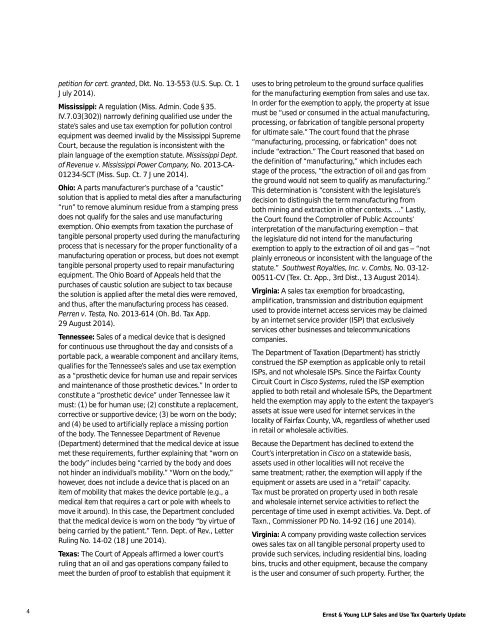EY-sales-and-use-tax-quarterly-october-2014
EY-sales-and-use-tax-quarterly-october-2014
EY-sales-and-use-tax-quarterly-october-2014
Create successful ePaper yourself
Turn your PDF publications into a flip-book with our unique Google optimized e-Paper software.
petition for cert. granted, Dkt. No. 13-553 (U.S. Sup. Ct. 1<br />
July <strong>2014</strong>).<br />
Mississippi: A regulation (Miss. Admin. Code §35.<br />
IV.7.03(302)) narrowly defining qualified <strong>use</strong> under the<br />
state’s <strong>sales</strong> <strong>and</strong> <strong>use</strong> <strong>tax</strong> exemption for pollution control<br />
equipment was deemed invalid by the Mississippi Supreme<br />
Court, beca<strong>use</strong> the regulation is inconsistent with the<br />
plain language of the exemption statute. Mississippi Dept.<br />
of Revenue v. Mississippi Power Company, No. 2013-CA-<br />
01234-SCT (Miss. Sup. Ct. 7 June <strong>2014</strong>).<br />
Ohio: A parts manufacturer’s purchase of a “caustic”<br />
solution that is applied to metal dies after a manufacturing<br />
“run” to remove aluminum residue from a stamping press<br />
does not qualify for the <strong>sales</strong> <strong>and</strong> <strong>use</strong> manufacturing<br />
exemption. Ohio exempts from <strong>tax</strong>ation the purchase of<br />
tangible personal property <strong>use</strong>d during the manufacturing<br />
process that is necessary for the proper functionality of a<br />
manufacturing operation or process, but does not exempt<br />
tangible personal property <strong>use</strong>d to repair manufacturing<br />
equipment. The Ohio Board of Appeals held that the<br />
purchases of caustic solution are subject to <strong>tax</strong> beca<strong>use</strong><br />
the solution is applied after the metal dies were removed,<br />
<strong>and</strong> thus, after the manufacturing process has ceased.<br />
Perren v. Testa, No. 2013-614 (Oh. Bd. Tax App.<br />
29 August <strong>2014</strong>).<br />
Tennessee: Sales of a medical device that is designed<br />
for continuous <strong>use</strong> throughout the day <strong>and</strong> consists of a<br />
portable pack, a wearable component <strong>and</strong> ancillary items,<br />
qualifies for the Tennessee’s <strong>sales</strong> <strong>and</strong> <strong>use</strong> <strong>tax</strong> exemption<br />
as a “prosthetic device for human <strong>use</strong> <strong>and</strong> repair services<br />
<strong>and</strong> maintenance of those prosthetic devices.” In order to<br />
constitute a “prosthetic device” under Tennessee law it<br />
must: (1) be for human <strong>use</strong>; (2) constitute a replacement,<br />
corrective or supportive device; (3) be worn on the body;<br />
<strong>and</strong> (4) be <strong>use</strong>d to artificially replace a missing portion<br />
of the body. The Tennessee Department of Revenue<br />
(Department) determined that the medical device at issue<br />
met these requirements, further explaining that “worn on<br />
the body” includes being “carried by the body <strong>and</strong> does<br />
not hinder an individual’s mobility.” “Worn on the body,”<br />
however, does not include a device that is placed on an<br />
item of mobility that makes the device portable (e.g., a<br />
medical item that requires a cart or pole with wheels to<br />
move it around). In this case, the Department concluded<br />
that the medical device is worn on the body “by virtue of<br />
being carried by the patient.” Tenn. Dept. of Rev., Letter<br />
Ruling No. 14-02 (18 June <strong>2014</strong>).<br />
Texas: The Court of Appeals affirmed a lower court’s<br />
ruling that an oil <strong>and</strong> gas operations company failed to<br />
meet the burden of proof to establish that equipment it<br />
<strong>use</strong>s to bring petroleum to the ground surface qualifies<br />
for the manufacturing exemption from <strong>sales</strong> <strong>and</strong> <strong>use</strong> <strong>tax</strong>.<br />
In order for the exemption to apply, the property at issue<br />
must be “<strong>use</strong>d or consumed in the actual manufacturing,<br />
processing, or fabrication of tangible personal property<br />
for ultimate sale.” The court found that the phrase<br />
“manufacturing, processing, or fabrication” does not<br />
include “extraction.” The Court reasoned that based on<br />
the definition of “manufacturing,” which includes each<br />
stage of the process, “the extraction of oil <strong>and</strong> gas from<br />
the ground would not seem to qualify as manufacturing.”<br />
This determination is “consistent with the legislature’s<br />
decision to distinguish the term manufacturing from<br />
both mining <strong>and</strong> extraction in other contexts. ...” Lastly,<br />
the Court found the Comptroller of Public Accounts’<br />
interpretation of the manufacturing exemption — that<br />
the legislature did not intend for the manufacturing<br />
exemption to apply to the extraction of oil <strong>and</strong> gas — “not<br />
plainly erroneous or inconsistent with the language of the<br />
statute.” Southwest Royalties, Inc. v. Combs, No. 03-12-<br />
00511-CV (Tex. Ct. App., 3rd Dist., 13 August <strong>2014</strong>).<br />
Virginia: A <strong>sales</strong> <strong>tax</strong> exemption for broadcasting,<br />
amplification, transmission <strong>and</strong> distribution equipment<br />
<strong>use</strong>d to provide internet access services may be claimed<br />
by an internet service provider (ISP) that exclusively<br />
services other businesses <strong>and</strong> telecommunications<br />
companies.<br />
The Department of Taxation (Department) has strictly<br />
construed the ISP exemption as applicable only to retail<br />
ISPs, <strong>and</strong> not wholesale ISPs. Since the Fairfax County<br />
Circuit Court in Cisco Systems, ruled the ISP exemption<br />
applied to both retail <strong>and</strong> wholesale ISPs, the Department<br />
held the exemption may apply to the extent the <strong>tax</strong>payer’s<br />
assets at issue were <strong>use</strong>d for internet services in the<br />
locality of Fairfax County, VA, regardless of whether <strong>use</strong>d<br />
in retail or wholesale activities.<br />
Beca<strong>use</strong> the Department has declined to extend the<br />
Court’s interpretation in Cisco on a statewide basis,<br />
assets <strong>use</strong>d in other localities will not receive the<br />
same treatment; rather, the exemption will apply if the<br />
equipment or assets are <strong>use</strong>d in a “retail” capacity.<br />
Tax must be prorated on property <strong>use</strong>d in both resale<br />
<strong>and</strong> wholesale internet service activities to reflect the<br />
percentage of time <strong>use</strong>d in exempt activities. Va. Dept. of<br />
Taxn., Commissioner PD No. 14-92 (16 June <strong>2014</strong>).<br />
Virginia: A company providing waste collection services<br />
owes <strong>sales</strong> <strong>tax</strong> on all tangible personal property <strong>use</strong>d to<br />
provide such services, including residential bins, loading<br />
bins, trucks <strong>and</strong> other equipment, beca<strong>use</strong> the company<br />
is the <strong>use</strong>r <strong>and</strong> consumer of such property. Further, the<br />
4<br />
Ernst & Young LLP Sales <strong>and</strong> Use Tax Quarterly Update


